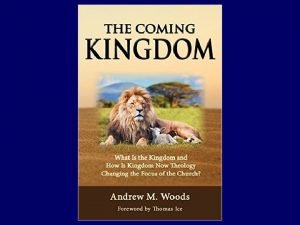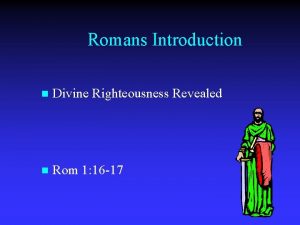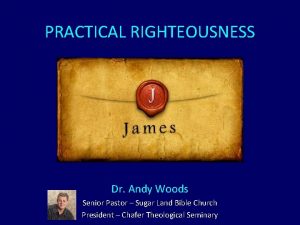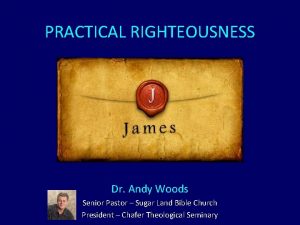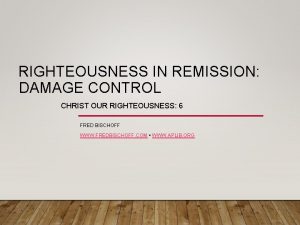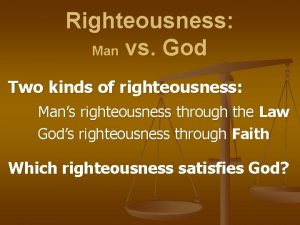Dr Andy Woods Divine Righteousness Revealed Review Answering

















- Slides: 17

Dr. Andy Woods

Divine Righteousness Revealed!

Review

Answering Eight Questions 1) Who wrote it? – Paul 2) Who was it written to? – Roman Believers 3) Where was it written from? – Corinth 4) When was it written? – A. D. 57 5) Why was it written? – Doctrinal Foundation 6) What is inside? – 7 Part Outline 7) What is it about? – Righteousness 8) What makes the book different? – Theological formality

Structure I. Salutation (1: 1 -17) II. Sin (1: 18– 3: 20) III. Salvation (3: 21– 5: 21) IV. Sanctification (6– 8) V. Sovereignty (9– 11) VI. Service (12: 1– 15: 13) VII. Summation (15: 14– 16: 27)


9– 11 Theme: How can God be trusted to be faithful to us if He has been unfaithful to Israel?

Sovereignty (Rom 9– 11) n Israel in the past: elected (Rom 9) n Israel in the present: rejected (Rom 10) n Israel in the future: accepted (Rom 11)

Israel in the Past: Elected (9: 1 -29) 1) Israel’s present rejection causes Paul grief (9: 1 -5) 2) God’s present rejection of Israel is consistent with God’s promises because God has always worked through individuals within the nation (9: 6 -13) 3) God’s election of some is consistent with God’s justice (9: 14 -29)

Israel in the Past: Elected (9: 1 -29) 1) Israel’s present rejection causes Paul grief (9: 1 -5) 2) God’s present rejection of Israel is consistent with God’s promises because God has always worked through individuals within the nation (9: 6 -13) 3) God’s election of some is consistent with God’s justice (9: 14 -29)

Overview (9: 14 -29) I. First objection (9: 14 -18) A. Objection (9: 14 a) B. Denial (9: 14 b) C. Proof (9: 15 -18) II. Second objection (9: 19 -29) A. Objection (9: 19) B. Answer (9: 20 -29)

Romans 9: 14 -18 I. First objection (9: 14 -18) A. Objection: God is unrighteous (9: 14 a) B. Emphatic denial (9: 14 b) C. Proof (9: 15 -18)

Romans 9: 14 -18 C. Proof (9: 15 -18) 1. God confers mercy upon who He wants (9: 15) 2. God is free to select those who will play positive and negative roles in His purposes (9: 16 -18)

Romans 9: 19 -29 II. Second objection (9: 19 -29) A. Objection: God cannot hold people morally accountable (9: 19) B. Two answers (9: 20 -29)

Romans 9: 19 -29 B. Two answers (9: 20 -29) A. God’s status as creator gives Him the right to elect (9: 20 -21) B. God elects to demonstrate His mercy (9: 22 -29)

Conclusion

Overview (9: 14 -29) I. First objection (9: 14 -18) A. Objection (9: 14 a) B. Denial (9: 14 b) C. Proof (9: 15 -18) II. Second objection (9: 19 -29) A. Objection (9: 19) B. Answer (9: 20 -29)
 Divine righteousness
Divine righteousness Andy woods the coming kingdom
Andy woods the coming kingdom David rockefeller memoirs page 405
David rockefeller memoirs page 405 H2cor
H2cor The coming kingdom andy woods
The coming kingdom andy woods Sugarland bible church
Sugarland bible church John 1:12 nasb
John 1:12 nasb Andy woods genesis
Andy woods genesis Daniel 8
Daniel 8 Andy woods soteriology
Andy woods soteriology Andy woods daniel
Andy woods daniel Pastor andy woods
Pastor andy woods Andy woods ezekiel
Andy woods ezekiel Andy woods angelology
Andy woods angelology Andy woods pastor wikipedia
Andy woods pastor wikipedia Andy woods zechariah
Andy woods zechariah Pastor andy wood
Pastor andy wood Andy woods pastor age
Andy woods pastor age

